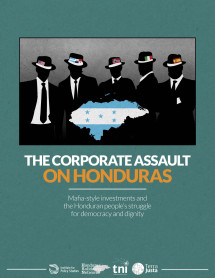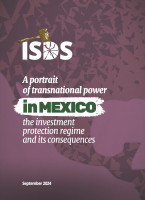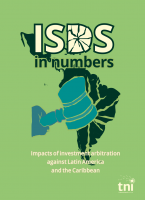The corporate assault on Honduras Mafia-style investments and the Honduran people’s struggle for democracy and dignity
Topics
Regions
This report explores the surge of mafia-style arbitration claims against Honduras, rooted in an unjust global economic order entrenched since the 1990s. Analyzing the post-coup context, it exposes how narco-dictatorship and neoliberalism enable illegitimate investments and odious debt, threatening the nation’s democracy and dignity, and poses urgent questions on dismantling these oppressive legal and economic frameworks.

Downloads
-
The corporate assault on Honduras: Mafia-style investments and the Honduran people’s struggle for democracy and dignity (PDF, 4.12 MB)Average time to read: 180 minutes
-
Summary: The corporate assault on Honduras (PDF, 1.68 MB)Average time to read: 20 minutes
Authors
An avalanche of corporate claims against Honduras in 2023 and 2024
(published in September 2024)
Honduras has received a total of 19 international arbitration claims from foreign and domestic investors. Between 2023 and 2024 alone it has been the recipient of 14 claims (as of August 2024) at the World Bank’s International Centre for Settlement of Investment Disputes (ICSID). During this period, the lawsuits have principally aimed at confronting some of the measures taken by the government of Xiomara Castro.
It is important to note that most of these lawsuits are based on claims from companies whose investments were made in an irregular manner during the period known as the narco-dictatorship in Honduras, following the 2009 coup d’état. In addition, roughly a third of them correspond to investments that have generated resistance from the populations most affected by the impact of those investments.
This set of recent lawsuits constitutes a corporate assault against the efforts of President Xiomara Castro’s administration and the social struggles of the Honduran people to emerge from the aftermath of the 2009 coup d’état. Recently, former President Juan Orlando Hernandez (2014-2022) was sentenced to forty-five years in prison in the Southern District of New York for crimes related to drug trafficking and weapons possession and use.
The investment protection system: Justice for corporations, not people
Supranational arbitration claims are made possible by the existence of a set of clauses in free trade agreements (FTAs), bilateral investment treaties (BITs), national investment laws, and contracts. The investor-state dispute settlement (ISDS) mechanism, included in domestic laws and international treaties, allows foreign investors to bypass national courts and bring their claims against states directly in international investment arbitration tribunals. This creates an international system of “parallel justice” that disregards, and often overrules, the national justice system.
Indeed, the foreign investment protection system is asymmetrical and one-sided, given it is a tool exclusively available to transnational investors that – in spite of illegalities, abuses, corruption, repression and lack of justice for affected communities – allows those investors to bring claims against sovereign states. At the same time, it provides an opportunity for companies and their representatives (in an obscure manner and behind closed doors) to use the threat of possible lawsuits to try to influence the scope or implementation of government policies that are important for public welfare, respect for collective rights and environmental protection. Arbitrators in these tribunals are not obliged to consider the human rights of peoples affected by investments, but rather rule on violations of investors’ rights.
In Honduras, four legal avenues exist which allow foreign investors to sue the State:
1. Eight bilateral investment treaties
2. Twelve free trade agreements, including the Dominican Republic-Central America-Unites States Free Trade Agreement (CAFTA-DR)
3. The 2011 Law for the Promotion and Protection of Investments
4. Contracts entered into by the government with foreign and domestic investors
Since 1999 Honduras has faced 19 claims, 15 of which are still pending; three were settled in favor of the investor and one was settled outside of arbitration.
On ten occasions the sources of the claims have been BITs and FTAs, in three instances they have come via the National Investment Law, and six times via contracts. All claims against Honduras have been brought at ICSID. In nine of the 19 claims, the investors have been advised by the U.S. law firm White & Case.
Mafia-style demands
We describe these lawsuits as “mafia-style,” given that the investments involved are, in general, plagued by irregularities and corrupt administrative decisions.
In addition, many of these investments were imposed against the will of the people or harmful to the public interest, having been facilitated in the context of the repressive government of Juan Orlando Hernandez (2014-2022). In many instances, investors have had direct or indirect links to criminal networks.
According to our analysis, the first “mafia-style” lawsuit against Honduras was in 2018 for US$1 billion, brought under the Panama-Central America Free Trade Agreement. It was made by Inversiones Continental (Panama) S.A., which belongs to the powerful Rosenthal family. It reflects a dispute between de facto powers in Honduras and the personal interests of former President Juan Orlando Hernández (JOH). The JOH government seized 60 Rosenthal family properties and assets after the US Office of Foreign Assets (OFAC) designated several family members and businesses as Specially Designated Narcotics Traffickers in 2015. Now the family is seeking to recover what it lost.
Corporate claims against legislative reforms
Between 2010 and 2022, in the post-coup period, it was declared that Honduras would be “open for business” (inaugurated with the 2011 conference “Honduras Is Open for Business”). This led to a deepening of neoliberal policies. Previously resisted policies were successfully imposed, such as the further privatization of the National Electricity Company (ENEE) and the promotion of Public-Private Partnership (PPP) contracts for infrastructure and transportation projects that were extraordinarily favorable to private interests. The most emblematic of the reforms was the creation of Employment and Economic Development Zones (ZEDE) as an extension of the concept of enclave investments or free trade zones. These are territories that enjoy a maximum degree of autonomy in terms of legal, tax and administrative regulation. According to ZEDE promoters, they would help attract private investment and promote a favorable business environment.
The most costly claim against Honduras has been filed in an attempt to contain the current administration’s efforts to dismantle the regulatory framework that enabled the ZEDEs after the coup d’état. A group of U.S. investors, represented by Honduras Prospera Inc. and others, has put in a claim for US$10,775 million, equivalent to almost three times the approved Public Investment Plan for Honduras in 2024. Prospera does not meet the legal requirements to develop a ZEDE, but has nonetheless filed this lawsuit to pressure the government to allow it to exist.
Most of the lawsuits now holding the country hostage stem from investments made after the 2009 coup and during the period known as the narco-dictatorship. Seven lawsuits have been filed against the current Honduran government’s attempts to renegotiate electricity cost contracts and its efforts to rescue ENEE. Five of these investors alone are seeking roughly US$1.3 billion from Honduras.
At least three lawsuits have been filed based on Public-Private Partnership contracts, including one from the energy sector. The other two have claimed a total of US$190 million and refer to contracts negotiated under conditions highly detrimental to the public treasury.
Corporate suits to undermine grassroots resistance
The 2009 coup d’état and the imposition of the narco-dictatorship were rejected by much of the population; similarly, there have been important processes of resistance to investments made during that period which have resulted in lawsuits against the State. In this way, these lawsuits are also being brought against the people who rose up to resist harmful projects that were repressively imposed and violated their rights. They demonstrate part of the reason why broad popular sectors rejected the signing of FTAs, such as CAFTA-DR, that came into force in 2006. Given their highly unfavorable terms for the Honduran people, and the resistance many of them have generated, these investments have little legitimacy in the country. It is unfair that the Honduran people must now pay more money to “compensate” transnational corporations for their relentless need for profit. These investors are the ones who really owe a debt to the people, not the other way around.
Six of the arbitration claims relate to investments that led to opposition from affected populations. This began with the ZEDEs, which aroused opposition from the communities directly affected (such as Crawfish Rock on the island of Roatan), as well as at the national level due to their implications for the entire country.
Despite threats and the criminalization of activists, community resistance persists against the Los Prados solar energy project of Norwegian investors Scatec, Norfund and KLP – because of the impacts it may have on local water resources, food sovereignty and the environment. These investors have brought two claims against Honduras for a total of US$400 million under the National Investment Law, and the communities fear this could influence renegotiations of these contracts to allow the expansion of the project against their will.
The privatization of electricity distribution and the collection of payments by Empresa Energía Honduras (EEH) generated many complaints about arbitrary, irregular and exorbitant electricity bills. This led to protests, including people placing locked metal boxes over their energy meters or painting them to avoid irregular charges. Now, Colombian investors are suing the country for US$500 million under the Free Trade Agreement between Colombia, El Salvador, Guatemala and Honduras.
Inhabitants of San Pedro Sula and El Progreso rose up for 421 days against the payment of tolls on highways (originally built with their own taxes) given the negative impacts that the privatization of mobility would have on the household economy. Despite having completed only 10% of the works agreed in the contract, Honduran authorities allowed the company to go ahead with the collection of tolls in 2016, which became known as a “monument to corruption”. The company Autopistas del Atlántico and a group of financiers, including JP Morgan Chase Bank and two Goldman Sachs funds, are now suing the state for $180 million under a Public-Private Partnership contract over this failed project from 2018.
Brothers Ernesto and Juan Carlos Argüello, of Miami, are suing Honduras under CAFTA-DR for $100 million plus $2 million in “moral damages”. They built a gated community known as “Los Castaños de Choloma” that was sold to maquiladora (factory) workers in the Sula Valley as a safe place for their families to live and an opportunity to become homeowners when they could not otherwise obtain bank loans. Based on this project, Ernesto Argüello fostered a reputation as a well-meaning philanthropist dedicated to building socially responsible housing in Latin America. But residents complain that the housing was of poor quality and, after tropical storms Eta and Iota in 2020, filed for the cancellation of the Argüellos’ company’s environmental permits and reparations, given serious deficiencies in their approval. The community is now working to take control of the management of their own lives and homes.
Chilling effect of lawsuits
These arbitration claims seek to influence public policy decisions in the country, in a phenomenon known as the “deterrent” or “chilling effect” on regulations and public policies. For example, they seek to slow down the efforts of the current government administration to dismantle the ZEDE framework, to rescue the National Electric Energy Company and to retake control of airport infrastructure. Moreover, they represent an impediment against any effective response to the demands from affected communities who reject the energy and mining projects that threaten their dispossession and displacement. The logic of the companies is simple: if the Honduran government or the communities affected do not allow them to do business, they demand multi-million-dollar compensation from the country – not only for what they supposedly invested, albeit irregularly, but also for their expectations of future profits.
Exits from the transnational investment protection system
In February 2024, Honduras signed its withdrawal from ICSID. Leaving ICSID is an important step, but not enough. Honduras has four legal mechanisms that allow investors to sue the State in any international arbitration center, not only ICSID. In other words, the next step for Honduras should be to move forward on revising the entire legal framework that grants privileges to investors: trade treaties, investment protection treaties, the 2011 Investment Law, as well as all contracts that include arbitration.
In the face of this, what can be done?
A non-partisan national coalition against the mafia-style investment protection system could be formed, in which social movements and other sectors of Honduran society can share information, organize and defend their communities from current and future demands. This coalition could draw on global networks composed of international organizations that also seek to eliminate this unjust system.
Such a coalition could demand that current and future governments:
• Do not sign new free trade agreements (FTAs) or bilateral investment treaties (BITs), or any contracts with investment protection clauses. On the contrary, give primacy to international human rights, indigenous, environmental and labor rights treaties.
• Terminate existing BITs that contain the ISDS mechanism. Exiting treaties is not only possible, it is imperative if a government’s objective is to implement development plans that respect human, indigenous, labor and environmental rights.
• Begin the urgent process of reforming the 2011 National Investment Law.
• Ensure transparency of information about ongoing lawsuits against Honduras, which would allow for the democratization of knowledge about the lawsuits and enable the participation of affected populations and organizations.
• Make public all contracts with foreign and domestic investors, and have them cancelled or renegotiated as a matter of urgency, given that many of them were signed with multiple irregularities.
• Strengthen national justice systems: that is where investors should resolve their disputes with the State, not in international arbitration.
• Conduct a comprehensive citizen’s audit of all legal instruments containing investment protection and arbitration claims that takes into account their economic, social and environmental impacts.
• Promote the active participation of the populations affected by projects involving foreign companies in such an audit, in accordance with their collective rights.
• Suspend the ability of investors to use ISDS for the duration of the audit, and follow its recommendations once it is concluded.
• Demand from counterparties the exclusion of ISDS from FTAs with investment protection, and the substantive reduction of the rights of investors included in the investment chapters of such treaties.
• Actively support the creation of a Binding Treaty on Transnational Corporations and Human Rights being discussed at the United Nations level, and combat the impunity of transnational and national corporations in regard to indigenous, economic, social, cultural and environmental rights.




